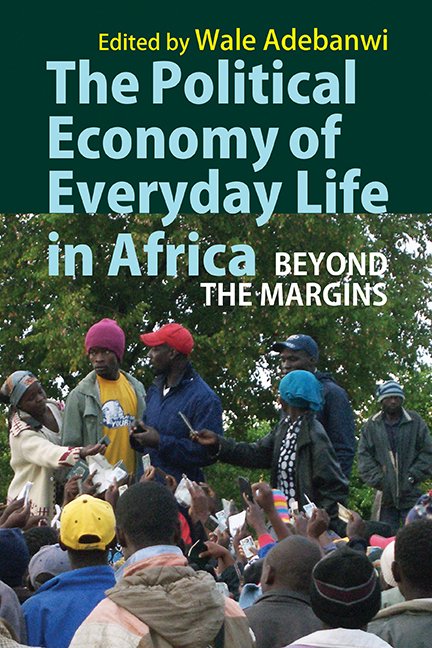Book contents
- Frontmatter
- Dedication
- Contents
- Maps, Illustrations & Tables
- Notes on Contributors
- Foreword
- Acknowledgements
- Approaching the Political Economy of Everyday Life An Introduction
- Part I MONEY MATTERS: CURRENCY & FISCAL LIFE STRUGGLES
- Part II LABOUR, SOCIAL LIVES & PRECARITY
- Part III MARGINALITY, DISAFFECTION & BIO-ECONOMIC DISTRESS
- Part IV HISTORICITY, TEMPORALITY, AGENCY & DEMOCRATIC LIFE
- Afterword: The Landscapes Beyond the Margins Agency, Optimization & the Power of the Empirical
- Index
Approaching the Political Economy of Everyday Life An Introduction
Published online by Cambridge University Press: 31 August 2018
- Frontmatter
- Dedication
- Contents
- Maps, Illustrations & Tables
- Notes on Contributors
- Foreword
- Acknowledgements
- Approaching the Political Economy of Everyday Life An Introduction
- Part I MONEY MATTERS: CURRENCY & FISCAL LIFE STRUGGLES
- Part II LABOUR, SOCIAL LIVES & PRECARITY
- Part III MARGINALITY, DISAFFECTION & BIO-ECONOMIC DISTRESS
- Part IV HISTORICITY, TEMPORALITY, AGENCY & DEMOCRATIC LIFE
- Afterword: The Landscapes Beyond the Margins Agency, Optimization & the Power of the Empirical
- Index
Summary
It is widely agreed that the two social mechanisms available for the generation and distribution of well-being are markets and politics.
(Benjamin Radcliff 2001: 941)Africa is often encountered as a continent in which all manners of extremities converge. Abundant natural resources coexist with extreme poverty; excessive wealth and conspicuous consumption are exhibited in the context of widespread immiseration. In the global imagination, life in Africa is characterized by excess and abjection: the excess of natural wealth and the abjection of pervasive poverty. In recent decades, due to a myriad of economic crises, political instability and social paralysis, the extremities of wealth and poverty have produced a progressive eradication of the middle ground between human happiness and human misery. Thus, much of the scholarship on Africa tends ‘toward a deterministically pessimistic view of development [in the continent] with the logic of neopatrimonialism unavoidably pushing the analysis towards ontological despair, hence its association with Afro-pessimism’ (Mkandawire 2015a: 602). Against this backdrop, Africa is often presented in ‘urgent and troubled tones’ (Ferguson 2006: 2).
Jane I. Guyer (2014: 13–14) recently summarized the implication of the conclusion reached by global neoliberal institutions regarding the current metrics of economic growth thus: ‘All the worst values of every indicator meet in Africa.’ Africa is, therefore, a very good template for examining the political-economic dynamics, structures, agencies and processes that define and determine human wellbeing, that is, how or whether people are able to live and live well – including the questions of ‘the vulnerability of human life and … what makes for a livable life’ (Butler and Athanasiou 2013: viii). Even though what we describe in this volume as the political economy of everyday life is not a culturally or regionally specific model, in practice, it is experienced in culturally or regionally specific ways.
Given the fact that ‘the “market principle” could never be understood shorn of its larger social and political history’ (Guyer 1997a: 5), this volume examines how African economies and economic institutions, processes and practices – in relation to the political and the social in the longue durée – enhance or weaken the possibilities of human viability and expand or limit the ‘vistas of human possibility’ (Guyer 2002a), that is, the capacity to live a good life. The capacity for a liveable life implies that such capacity can be enhanced and expanded or weakened and destroyed.
- Type
- Chapter
- Information
- The Political Economy of Everyday Life in AfricaBeyond the Margins, pp. 1 - 32Publisher: Boydell & BrewerPrint publication year: 2017
- 3
- Cited by



